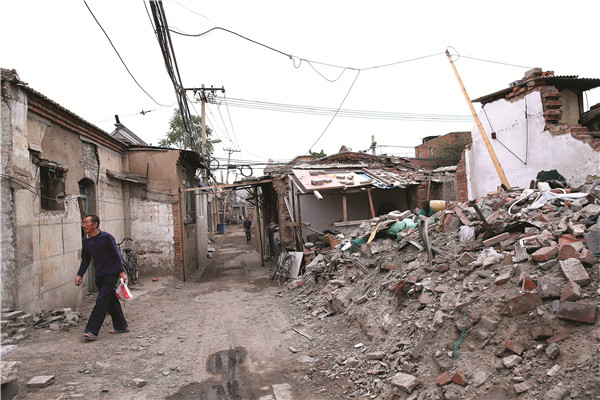Building a future for ancient neighborhoods
 |
|
Luanqing Hutong in Beijing’s Dongcheng district is under threat of demolition. [Zou Hong / China Daily] |
More than protection
However, Hua Xinmin is not so concerned about how best to renovate the aging, poorly equipped homes. She is more worried about who rightfully owns them.
"No matter how fancy the decoration might look, it is fundamentally wrong if the owners of the homes are not involved in the decision-making process," she said.
Hua refers back to the early 1950s, when many residents moved to the city for work following the nationalization of private enterprises. The situation is described in Old City Planning, a book by Feng Feifei.
To solve the housing problem, according to the standard in Beijing at the time, families with more than 15 rooms or 225 square meters of space in total, were asked to give the leasing rights of additional rooms to local governments so they could be rented out. The homeowners were then given one-third of the rent collected from those surplus rooms.
The exercise involved around 230,000 rooms and 6,000 households.
Then, during the "cultural revolution" (1966-76), many of the house owners were forced to hand their property deeds to the Red Guards — students and young people mobilized to implement the goals of the "cultural revolution" — or reluctantly accepted other incentives in return for the ownership documents.
While houses have been returned to the original owners in many cities that had similar issues, many property owners in the capital are still struggling to get their houses back and remain tenants instead of owners.
"The more I'm involved in the work, the more I realize that property rights are at the heart of the hutong protection issue. Without the respect of property rights, the protection of the Old City is groundless," Hua said.
When the CHP was founded in 2003, they decided the slogan they wanted to use was "Help the community residents protect their own cultural heritage", which He Shuzhong still takes great pride in today.
"Protection of the Old City of Beijing is essentially about the rule of law — is the existing law being fully implemented and do the residents have a say in the decision-making process? " He said.
"Each of these question is bigger than the protection issue itself and the protection won't be successful without their progress."
He said he is pleased to witness the growing awareness of the hutong issue among the public, which will be the fundamental driving force of change in the long run.
"I still remember, in the beginning we only had a couple of people in the audience attending our lectures and now we have many more and so many volunteers helping us on this project," he said.
Feng from the Beijing Municipal Institute of City Planning and Design, which is part of the Beijing Municipal Commission of Urban Planning, said society as a whole is playing a much larger role in the protection of historic neighborhoods.
"In the past, the government bodies and NGOs tended to look at each other with suspicion, but now we are building trust and can cooperate in some cases," Feng said.
On the ground
Today, the Baitasi area which surrounds the white pagoda is part of the most protected conservation zone, and hutong there must not be demolished.
Instead, more than 900 courtyards in the area are being renovated. Residents such as He can choose whether they want to carry on living in the renovated homes or opt for resettlement.
Many people have decided to move into the suburban apartments on offer after receiving compensation from the government. They also like the idea of no longer needing to use public toilets and being able to park their cars more easily.
Homes that stand empty awaiting renovation and, in many cases new tenants, are wrapped in red plastic paper with the silhouettes of the white pagoda and skyscrapers printed on them and the words "Capture the opportunities and fulfill the dream of settling down".
He said he is now seeing more and more of these "wrapping paper" houses in the neighborhood, but he has no intention of being among those who are leaving.
"As soon as I get into my hutong, the noise of the big city disappears, and having my feet steady on the ground is a good feeling that people who live in tall buildings cannot understand."
Contact the writers at tangyue@chinadaily.com.cn and cuijia@chinadaily.com.cn
















